|
|
|
Sort Order |
|
|
|
Items / Page
|
|
|
|
|
|
|
| Srl | Item |
| 1 |
ID:
090166
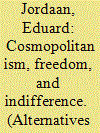

|
|
|
|
|
| Publication |
2009.
|
| Summary/Abstract |
Despite cosmopolitanism's concern for the world's poor and its concomitant heavy moral demands, cosmopolitans establish a limit to the self's responsibility for the global poor. This contrasts with Emmanuel Levinas's view that the self has an infinite responsibility for the other, a responsibility that derives from the self's questioning of the impact of his freedom on others. From a Levinasian perspective, cosmopolitanism's restriction of the self's responsibility for others creates a sphere of rightful indifference to the needs of the other; lends legitimacy to a disregard of the other; forestalls an ethical awakening to the other; constrains the achievement of a more just global order, given that, from a Levinasian perspective, a better justice is built on the self's open-ended responsibility for the other; and points to a tension at the heart of cosmopolitanism, considering the coexistence of elements that both frustrate and aspire to the achievement of global justice. It is concluded that the achievement of cosmopolitanism's goals would require the acceptance of an open-ended responsibility for the other.
|
|
|
|
|
|
|
|
|
|
|
|
|
|
|
|
| 2 |
ID:
163248
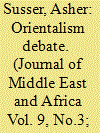

|
|
|
|
|
| Summary/Abstract |
Bernard Lewis, unquestionably the greatest Middle East historian of our times, had clear conceptions of the region and the peoples that were the focus of his decades of scholarship. He believed that to “understand anything at all about what is happening in the Muslim world … there are two essential points which need to be grasped. One is the universality of religion as a factor in the lives of the Muslim peoples, and the other is its centrality.” Lewis, however, had fierce opponents to his views on this centrality of Islam. Chief among them was Edward Said who refused to accept the “notion that there are geographical spaces with indigenous, radically ‘different’ inhabitants who can be defined on the basis of some religion, culture, or racial essence proper to that geographical space.” In the Saidian worldview, the idea that the “Other” was indeed different, was disqualified as politically incorrect and unacceptable. To argue in the name of a Middle Eastern “Otherness” was “essentialist,” “Orientalist,” or even “racist.” Among Western scholars a deeply ingrained reticence evolved to recognize the Otherness of this Middle Eastern Other. Otherness became all too easily conflated with racism and, thus, illegitimate by definition. The penetration of this “Saidism” into academe and the media, of this reluctance to recognize the Otherness of the Other, has led, perhaps more than any other single factor, to the misunderstanding and misinterpretation of the contemporary Middle East.
|
|
|
|
|
|
|
|
|
|
|
|
|
|
|
|
| 3 |
ID:
158099
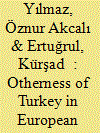

|
|
|
|
|
| Summary/Abstract |
This paper discusses how Turkey’s otherness to European identity, as represented by the European Union (EU), was turned into an asset during the beginning of the AKP rule. To the extent that the AKP represented the Islamic cultural other against both the secular establishment of Turkey and the EU, its promise to fulfill the Copenhagen political criteria and adopt EU norms and standards provided a possibility of ‘a model’ for the EU. This was the promise of a self-transforming cultural other becoming a part of the EU normative order and representing this system in its region. In the period between 2002 and 2005, there was a compromise on Turkey’s projected identity between the EU and the AKP. Yet this early promise and the ensuing compromise could not be sustained and realized in the following phases of the AKP rule. First stagnation between 2005 and 2010 and then a break wasted this promising new beginning.
|
|
|
|
|
|
|
|
|
|
|
|
|
|
|
|
| 4 |
ID:
188172
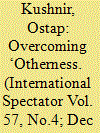

|
|
|
|
|
| Summary/Abstract |
The idea of ‘Europe’ in Central and Eastern Europe (CEE) has evolved significantly during the three decades of post-communist transition. Initially, anti-Soviet elites from the 1980s portrayed the region as equal/complementary to the Western part of the continent, which for its part perceived CEE as its ‘Other’. The first decade of post-communist transition was marked by a switch to nationalist thinking and the evocation of the idea of ‘Europe’ as one of nation-states. Finally, contemporary discourses of ‘Europe’ in CEE revolve around three different pillars, that is, European exceptionalism, European universalism and Transatlanticism, in contrast to Western discourses.
|
|
|
|
|
|
|
|
|
|
|
|
|
|
|
|
| 5 |
ID:
116667
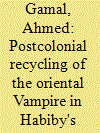

|
|
|
|
|
| Publication |
2013.
|
| Summary/Abstract |
This article examines Emile Habiby's Saraya, The Ghoul's Daughter (1991) and Bharati Mukherjee's Jasmine (1989) as two postcolonial novels seeking to rewrite the history of Palestinian and Indian diaspora according to their respective myths of Oriental vampires. Habiby's recycling of the Palestinian folktale of the ghoul and Mukherjee's recuperation of the Hindu myth of Lord Shiva aim to spotlight the classical vampiric topoi of otherness, unspeakableness, foreignness, and border existences in colonial and postcolonial contexts. Postcolonial Gothic writing is thus shown to foreground gender, nationality, and ethnicity as sites of both power conflict and cultural exchange. Adopting a counter-Orientalist approach, the study sheds light on the different strategies these two postcolonial texts employ to deconstruct the demonic and ghostly constructions of Arabs and Indians.
|
|
|
|
|
|
|
|
|
|
|
|
|
|
|
|
| 6 |
ID:
174383
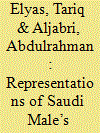

|
|
|
|
|
| Summary/Abstract |
There has been a tremendous interest in the Western media concerning the status of women in Saudi Arabia. The recent reform in women’s rights and guardianship system has Western media gone into motion frenzy. A few research has been done on the representation of Saudi women in Arabic newspapers, but there is a scarce of research in Western English newspapers to date. This article exercises a critical discourse analysis approach to investigate the language used in three famous Western newspapers to uncover the hidden ideologies behind the representation of Saudi women’s guardianship system. To this end, van Dijk’s (2004) analytical framework was employed to reveal the underlying ideologies of six reports by The Washington Post, The Guardian, and Toronto Star. The findings show that the three newspapers have expressed the notion of “otherness” in their descriptions of Saudi Arabia and Saudi women. Furthermore, the newspapers have shared the employment of consensus and negative other-presentation to portray Saudi women as being oppressed and subordinate.
|
|
|
|
|
|
|
|
|
|
|
|
|
|
|
|
| 7 |
ID:
179318
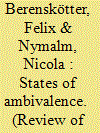

|
|
|
|
|
| Summary/Abstract |
This article revisits and revives the concept of ‘the Stranger’ in theorising international relations by discussing how this figure appears and what role it plays in the politics of (collective) identity. It shows that this concept is central to poststructuralist logic discussing the political production of discourses of danger and to scholarship on ontological security but remains subdued in their analytical narratives. Making the concept of the Stranger explicit is important, we argue, because it directs attention to ambivalence as a source of anxiety and grasps the unsettling experiences that political strategies of conquest or conversion, including practices of securitisation, respond to. Against this backdrop, the article provides a nuanced reading of the Stanger as a form of otherness that captures ambiguity as a threat to modern conceptions of identity, and outlines three scenarios of how it may be encountered in interstate relations: the phenomenon of ‘rising powers’ from the perspective of the hegemon, the dissolution of enmity (overcoming an antagonistic relationship), and the dissolution of friendship (close allies drifting apart). Aware that recovering the concept is not simply an academic exercise but may feed into how the term is used in political discourse and how practitioners deal with ‘strange encounters’, we conclude by pointing to alternative readings of the Stranger/strangeness and the value of doing so.
|
|
|
|
|
|
|
|
|
|
|
|
|
|
|
|
|
|
|
|
|